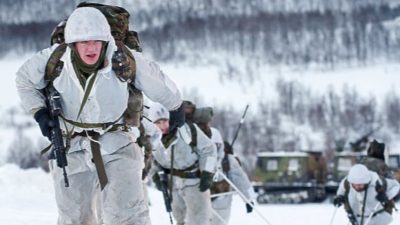UK Marines Conducted Covert Ops in Ukraine, General Claims

All Global Research articles can be read in 51 languages by activating the Translate Website button below the author’s name.
To receive Global Research’s Daily Newsletter (selected articles), click here.
Follow us on Instagram and Twitter and subscribe to our Telegram Channel. Feel free to repost and share widely Global Research articles.
***
The British Royal Marines have carried out high-risk special operations on the ground in Ukraine, according to the former head of the elite unit, who said UK commandos have been deployed to the country on more than one occasion this year.
Writing in the Royal Navy’s official magazine, the Globe and Laurel, Lieutenant General Robert Magowan said some 350 Marines were sent to Ukraine for two missions since January, starting with an operation to help relocate UK diplomatic staff to Poland just ahead of Russia’s invasion.
The second occurred in April, soon after Moscow’s withdrawal from the region surrounding the Ukrainian capital, according to Magowan, who was once the commandant general of the Royal Marines and now serves as a senior official under the Chief of the Defense Staff.
“In April, they returned into the country to re-establish the diplomatic mission, providing protection to critical personnel,” the general said. “During both phases, the commandos supported other discreet operations in a hugely sensitive environment and with a high level of political and military risk.”
Though Magowan did not elaborate on what those “other” missions entailed, he is the first British official to publicly confirm special operations in the country since Russia’s attack began in February. The UK Defense Ministry previously acknowledged that soldiers were sent to protect embassy staff, but has never discussed missions on the scale described by Magowan and rarely comments on covert ops.
Asked about the general’s claims, a Royal Navy spokesman would only say that Marines were “deployed to Ukraine to support the UK’s diplomatic presence,” but stressed that “they served no combat function.”
The Marine unit sent for both deployments, known as 45 Commando, now reportedly specializes in “Arctic warfare,” according to the Times, but previously took part in the Falklands conflict, as well as the US-led invasions of Iraq and Afghanistan.
Troops from 45 Commando were stationed in Norway for winter exercises when they were called to assist evacuation efforts from Ukraine to Poland earlier this year. The neighboring state has served as a staging area for Western military aid to Kiev and foreign volunteers looking to join the fight.
Magowan also hailed the Marines for their help in training Ukrainian forces on foreign territory, saying they have been “heavily involved” in the process and are now planning to train up “Ukraine marines.”
British military trainers were ostensibly withdrawn early this year to avoid potential clashes after Russian troops entered the country, but special operators have continued the training efforts since, local commanders previously told the Times. Ukrainian officers said UK soldiers returned to the Kiev area in April to instruct recruits on how to use British-supplied weapons, such as the NLAW anti-tank weapon. Though that training would have coincided with one of the deployments reported by Magowan, it’s unclear whether those soldiers were Royal Marines.
*
Note to readers: Please click the share buttons above. Follow us on Instagram and Twitter and subscribe to our Telegram Channel. Feel free to repost and share widely Global Research articles.
Will Porter is assistant news editor at the Libertarian Institute and a staff writer at RT. Find more of his work at Antiwar.com and Consortium News.
Featured image: Royal Marines with the elite 45 Commando unit are seen during exercises in Norway’s High North Region. (Credit: UK Defense Ministry / Nick Tryon)

